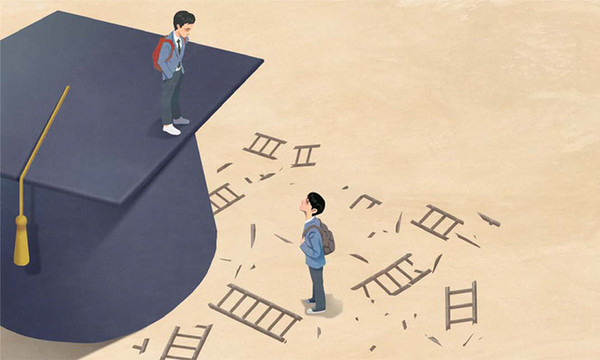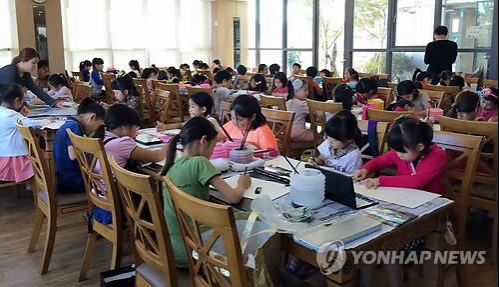The Moon Jae-in government implemented a policy to completely convert autonomous private high schools and foreign language high schools into regular high schools by 2025. On the contrary, the 20th presidential transition committee, preparing for the transfer of power of President-elect Yoon Seok-yeol in May, choose to maintain those elite high schools. Thus, the issue of the abolition of elite high schools, which became a big issue for students and parents during the last administration, returned to its origin. However, elite high schools contradict the high school credit system, exacerbate inequality in college admissions and cause elementary and middle school students to become involved in the competition for entrance exams. Therefore, they should not remain in Korea.
First, maintaining elite high schools is incompatible with the high school credit system that will be fully implemented in 2025. The high school credit system is a system in which students select and take courses according to their individual interests and aptitudes. It was introduced to provide an opportunity for students to receive an education that is tailored to each individually, away from the education focused only on university entrance exams. As a result, students can take courses that they want according to their planned career path. The 20th presidential transition committee also reviewed the high school credit system positively. In order to smoothly implement it, the current relative evaluation grading system must be converted to an absolute evaluation. If the relative evaluation is maintained, students might concentrate on subjects where they can easily get good grades which is contrary to the purpose of the high school credit system. However, this high school credit system is difficult to parallel with elite high schools. These schools have a lot of students with excellent academic performance, so they are at a disadvantage in getting good marks in relative evaluations. In other words, regular high schools have an advantage over elite high schools in academic performance. However, if the grading system is changed to absolute evaluation along with the establishment of the high school credit system, students in elite high schools would less worry about their scores, which would cause the superiority of regular high school scores to disappear. In the end, students with excellent grades will be more focused on elite schools. Justice Party Policy Representative Song Kyung-won said, “If the high school credit system and elite high schools are combined, it will create a top-level track that will start from middle school and goes through privileged schools to prestigious universities.”

Second, it exacerbates inequality in college entrance. According to the Ministry of Education in 2019, the tuition fees for foreign language high schools and private high schools, are on average more than three times that of regular high schools. The cost that parents of regular high schools had to pay for their children's school life was about 2.8 million won per year. In contrast, in prestigious private high schools, such as Korean Minjok Leadership Academy and Sangsan High School, parents paid about 12.5 million won a year, a difference of over 400%. Now, even after three years, the tuition fees of these schools have not decreased. After all, it is the parents who have to pay these tuition fees, and high-income levels of parents are inevitably required for students to attend high-cost schools. In fact, according to a study conducted by Seoul National University of Education in 2020, 3.5% of students from households with an average monthly household income of 7 million to 10 million won went to elite high schools. However, only 1.4% of students from households with a monthly income of 1 to 3 million won went on to those schools. On the other hand, it has already been proven that elite high school students have an advantageous position in college admissions. According to a report by Hankyoreh from July 4th, 2021, 42.7% of Seoul National University admissions in that year were from elite high schools. Next, Korea University, Yonsei University, Sungkyunkwan University, and Hanyang University were the most preferred universities in Korea with the highest number of admissions from elite high schools. As long as elite high schools, where much higher levels of financial support are essential, remain, the door to the top universities will inevitably be opened more to children from families with a certain level of wealth.

Third, competition for high school entrance among elementary and middle school students overheats. On April 28th, the Korean Teachers & Educational Worker's Union (KTU) urged the 'abolition of elite schools such as autonomous private/foreign language high schools and revitalization of general high schools' at a press conference. The reason was that elite schools led to excessive competition for high school entrance among elementary and secondary students. Competition for entrance can be explained by dependence on private education. Korean students head to the private education industry to get satisfying grades in school exams and enter prestigious colleges that are well-received by society. According to the KTU on May 3rd, out of 1841 elementary school students in grades 4, 5, and 6 nationwide, 88.1% of the total children were receiving private education. Also, about 65% of them work with two or more private tutors. Due to the distinction between the elite and regular high schools, young students are competing to keep pace. Kim Seong-cheon, a professor at the Korea National University of Education, said, “If elite high schools are maintained, it is natural for families of elementary and middle school students preparing for high school admission to increase their private education expenses. If elite high schools remain, students should devote a lot of time to private education even before entering high school.

The government should withdraw the decision to retain elite high schools. Leaving these schools will hinder the establishment of a high school credit system that requires a transition to absolute evaluation. Furthermore, elite high schools make teenage students who value college admissions experience inequality due to their parents' income levels. They also encourage competition among young elementary/middle school students and create an excessive pursuit of private education.
Those in favor of it argued that maintaining elite high schools ensures diversification of high school types along with students' right to choose and accords with the Korean Constitution. Furthermore, those in favor of keeping the elite high schools said that even if elite high schools disappear, it would be impossible to eliminate rank in education and solve the private education problem. In contrast, those opposed explained elite high schools are an obstacle to the high school credit system, exacerbate inequality in college entrance, and intensify competition for high-school entrance. It is difficult to choose either side, regarding the bases of each stance. CAH hopes that the government to come up with rational education policies that can encourage the study of all students and guarantee the right to education.

